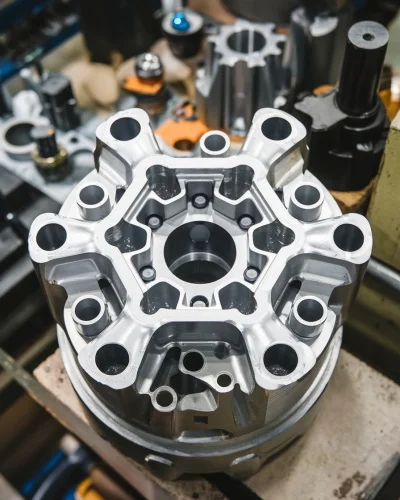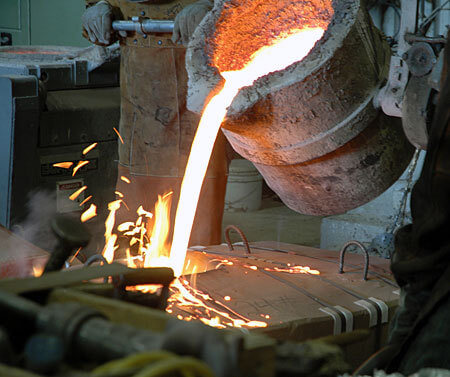How Light Weight Aluminum Foundries Add To Numerous Industries: An Extensive Overview
Light weight aluminum shops work as vital distributors throughout numerous sectors, including auto, aerospace, building and construction, and electronics. They generate components that are not only lightweight but additionally long lasting, enhancing the performance of different items. With advanced spreading strategies and a dedication to sustainability, these shops are adjusting to satisfy developing sector demands. As they innovate, the influence of light weight aluminum castings on different applications increases important concerns about the future of production. What exists ahead for this essential sector?
The Role of Light Weight Aluminum Foundries in the Automotive Market
As the auto sector significantly accepts lightweight products to improve gas efficiency and efficiency, light weight aluminum factories play an important role in this development. These centers specialize in the manufacturing of aluminum spreadings, which are crucial parts in modern cars. By providing high-strength, lightweight parts, aluminum foundries enable manufacturers to lower the overall weight of vehicles, eventually leading to boosted fuel economic climate and decreased discharges.
Aluminum's resistance to deterioration additionally improves vehicle longevity, making it an attractive selection for car manufacturers. Foundries utilize innovative strategies such as die spreading and sand spreading to create detailed and specific parts, making sure that they fulfill strict sector criteria. Furthermore, the ability to recycle aluminum successfully adds to a more lasting production process. As the automotive market remains to innovate, light weight aluminum shops will stay essential in delivering the materials required for the future generation of lorries, sustaining both efficiency and ecological objectives.

Aerospace Applications of Aluminum Castings
Light weight aluminum spreadings are indispensable to the aerospace industry, offering a combination of lightweight strength and resilience that is critical for aircraft performance. These castings are made use of in different components, such as engine parts, architectural frameworks, and landing equipment, where weight decrease is important for fuel effectiveness and general safety. The flexibility of light weight aluminum permits complex geometries that improve aerodynamic efficiency while keeping architectural integrity.
Improvements in casting innovations have boosted the precision and surface area coating of aluminum components, minimizing the requirement for substantial post-processing. This effectiveness not just accelerates manufacturing timelines yet also reduces expenses, making light weight aluminum an eye-catching selection for suppliers. The deterioration resistance of aluminum assurances long life and dependability in extreme operating environments, further establishing its function in aerospace applications. As the industry advances, aluminum castings remain to be an important material, driving advancement and supporting the development of next-generation airplane.
Construction Sector Developments Via Light Weight Aluminum
The building and construction industry has actually progressively adopted aluminum because of its lightweight residential properties and versatility, paralleling its successful applications in aerospace. Technologies in light weight aluminum design have resulted in stronger, much more efficient structures, enabling architects and home builders to check out new opportunities. The material's resistance to rust and low upkeep needs make it particularly appealing for both household and business tasks.
Aluminum's flexibility helps with the production of complex layouts, allowing for visual enhancements that were previously difficult with conventional products. Prefabrication techniques have additionally advanced, making use of light weight aluminum to decrease building and construction time and prices significantly. Additionally, the power performance of light weight aluminum systems-- such as home window structures and roofing-- adds to lasting building practices, lining up with modern environmental standards. As the building industry proceeds to welcome these developments, aluminum's role is anticipated to broaden, driving further innovation and adding to the advancement of resilient frameworks.
Electronics and the Demand for Lightweight Aluminum Parts
With the quick development of technology, the demand for light-weight light weight aluminum components in the electronic devices market has risen. As tools end up being much more small and mobile, suppliers seek materials that use both toughness and weight decrease. Aluminum, with its superb strength-to-weight proportion, has arised as a favored selection for parts such as housings, heat sinks, and architectural supports.
The use of light weight aluminum not just enhances product efficiency however also adds to power performance, as lighter gadgets need less power throughout procedure. Additionally, aluminum's outstanding conductivity makes it perfect for digital applications, guaranteeing efficient heat dissipation and lessening the threat of getting too hot.
As consumer choices change towards smooth and lightweight devices, aluminum factories play a necessary function in meeting the evolving needs of the electronic devices market (aluminum casting). Their ability to generate high-grade and precise light weight aluminum elements supports technology, enabling suppliers to press the borders of layout and capability
Lasting Practices in Light Weight Aluminum Foundries
As the electronics sector increasingly focuses on sustainability, aluminum factories are adapting their techniques to line up with these ecological goals. Lots of shops are executing recycling programs that recover aluminum scrap, substantially minimizing the requirement for basic materials and decreasing waste. By utilizing energy-efficient modern technologies, these facilities are decreasing their carbon impact; as an example, employing electric heating systems as opposed to conventional gas-fired ones can result in substantial energy savings.
Furthermore, light weight aluminum foundries are purchasing water preservation measures, such as closed-loop systems that reuse water made use of in cooling processes. These methods not just reduced water usage however likewise reduce the environmental effect related to wastewater discharge. Lots of factories are checking out eco-friendly energy sources, such as solar and wind power, to fulfill their energy requires sustainably. With these initiatives, light weight aluminum factories exhibit a dedication to environmental stewardship while remaining to meet the demands of the electronic devices industry.
Future Fads in Light Weight Aluminum Shop Technologies
Arising innovations are positioned to change light weight aluminum factories, improving performance and item top quality while progressing sustainability initiatives. Technologies such as synthetic knowledge and artificial intelligence are expected to optimize manufacturing procedures by forecasting equipment failures and enhancing source allowance. The integration of advanced robotics will streamline operations, reducing labor expenses and decreasing human mistake.
Additive manufacturing, or 3D printing, is likewise getting grip, allowing the manufacturing of complicated geometries that were formerly unattainable with typical techniques. This shift might lead to considerable material savings and reduced waste. Furthermore, wise factories using IoT (Internet of Points) technologies will enable real-time tracking and data evaluation, fostering positive decision-making.
Last but not least, the adoption of cleaner melting technologies and reusing strategies will certainly better lower the environmental impact of light weight aluminum foundries, making them much more lasting. Collectively, these trends signify a future where aluminum factories can run with greater effectiveness and duty.
Regularly Asked Concerns
What Are the Environmental Influences of Light Weight Aluminum Foundries?

Exactly How Do Foundries Make Sure Quality Control in Light Weight Aluminum Casting?
Shops guarantee top quality control in light weight aluminum spreading by carrying out rigorous examination procedures, making use of innovative technology, conducting routine product screening, and adhering to industry criteria, thereby maintaining consistency and dependability in their completed items. Precision aluminum casting.
What Is the Average Lifespan of Light Weight Aluminum Cast Parts?
The ordinary life-span of aluminum actors components typically varies from 10 to 50 years, depending upon elements such as environmental problems, use, and maintenance. Correct care can significantly boost their longevity and efficiency gradually.
Just How Are Light Weight Aluminum Alloys Selected for Particular Applications?
Light weight aluminum alloys are picked based upon factors such as strength, deterioration resistance, weight, and thermal conductivity. Designers examine the details needs of applications to establish the most appropriate alloy for best performance and longevity.
What Are the Safety Rules for Aluminum Factory Employees?
Safety policies for light weight aluminum foundry workers include personal protective tools mandates, air flow demands, exposure limitations to unsafe materials, and procedures for managing molten metal. Conformity guarantees employee safety and minimizes health risks connected Aluminum Casting Company with factory operations.
As the auto industry increasingly embraces lightweight materials to enhance gas performance and performance, light weight aluminum shops play a vital function in this development. As consumer preferences shift towards lightweight and smooth gadgets, aluminum foundries play a vital function in satisfying the advancing demands of the electronic devices market. As the electronics industry progressively prioritizes sustainability, aluminum factories are adapting their techniques to straighten with these ecological objectives. Several factories are applying reusing programs that redeem aluminum scrap, greatly reducing the demand for raw materials and lessening waste. Safety and security laws for light weight aluminum foundry workers include personal protective equipment mandates, air flow requirements, exposure restrictions to unsafe materials, and procedures for handling molten steel.